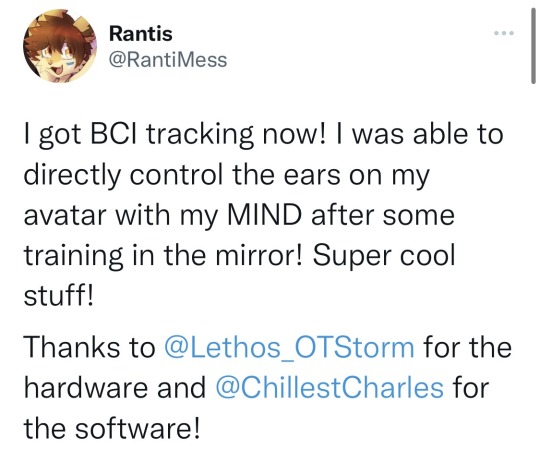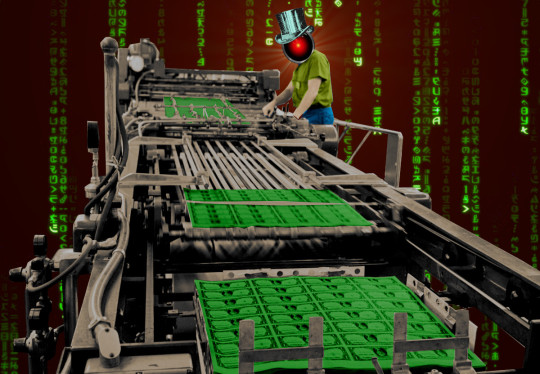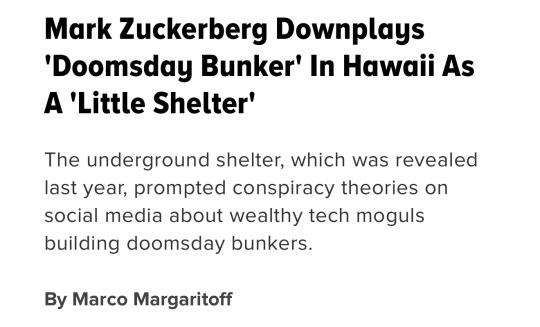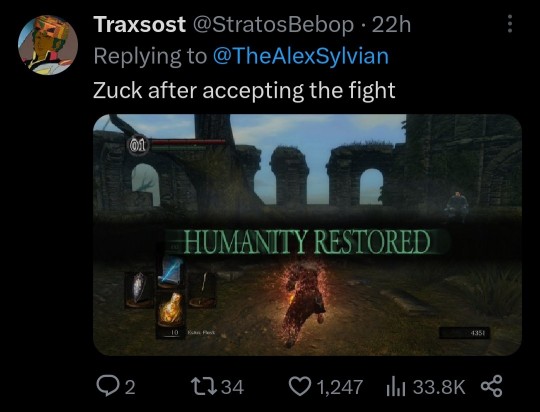#METAVERSE
Explore tagged Tumblr posts
Text



All these billionaires who invested in the metaverce and Neuralink must be questioning their life choices looking at what what furries are doing in VR chat.
43K notes
·
View notes
Text
infecteds design should be good now
#regretevator#roblox#roblox dev#infected regretevator#infected#regretevator infected#metaverse#this is not actually happening i just really wanted a nasty ugly looking infected
2K notes
·
View notes
Text

By SUTU
#nestedneons#cyberpunk#cyberpunk art#cyberpunk aesthetic#art#cyberpunk artist#cyberwave#scifi#neon art#metaverse#neon aesthetic#creature#glitch#glitch art#glitch aesthetic#neonwave#synthwave#neoncore#virtual world#crypto art#loop#vj#vj visuals#vj clip#vj loop#visuals
5K notes
·
View notes
Text
This is gonna sound dumb, but it already feels isolationing from the rest of the world. Things are gonna be different even if it comes back.
868 notes
·
View notes
Text


#art#cyber girl#simulation#cybercore#aesthetic#retro futurism#scifi#scifi girl#metaverse#ghost in the shell#ghost in the machine#beauty
191 notes
·
View notes
Text
Two weak spots in Big Tech economics

I'm on a 20+ city book tour for my new novel PICKS AND SHOVELS. Catch me in AUSTIN on Mar 10. I'm also appearing at SXSW and at many events around town, for Creative Commons, Fediverse House, and EFF-Austin. More tour dates here.

Big Tech's astonishing scale is matched only by its farcical valuations – price-to-earnings ratios that consistently dwarf the capitalization of traditional hard-goods businesses. For example, Amazon's profit-to-earnings ratio is 37.65; Target's is only 13.34. That means that investors value every dollar Amazon brings in at three times the value they place on a dollar spent at Target.
The fact that Big Tech stocks trade at such a premium isn't merely of interest to tech investors, or even to the personal wealth managers who handle the assets of tech executives whose personal portfolios are full of their employers' stock options.
The high valuations of tech stocks don't just reflect an advantage over bricks and mortar firms – they are the advantage. If you're Target and you're hoping to hire someone who's just interviewed at Amazon, you have to beat Amazon's total compensation offer. But when Amazon makes that offer, they can pay some – maybe even most – of the offer in stock, rather than in cash.
This is a huge advantage! After all, to get dollars, both Amazon and Target have to convince you to spend money in their stores (or, in Amazon's case, with its cloud, or as a Prime sub, etc etc). Both Amazon and Target get their dollars from entities outside of the firm's four walls, and the dollars only come in when they convince someone else to do business with them.
But stock comes from inside the firm. Amazon makes new Amazon shares by typing zeroes into a spreadsheet. They don't have to convince you to buy anything in order to issue that new stock. That is their call, and their call alone.
Amazon can buy lots of things with stock – not just the labor of in-demand technical workers who command six-figure salaries. They can even buy whole companies using stock. So if Amazon and Target are bidding against one another for an anticompetitive acquisition of a key supplier or competitor, Amazon can beat Target's bid without having to spend the dollars its shareholders would like them to divert to dividends, stock buybacks, etc.
In other words, a company with a fantastic profit/earning ratio has its own money-printer that produces currency that can be used to buy labor and even acquire companies.
But why do investors value tech stocks so highly? In part, it's just circular reasoning: a company with a high stock price can beat its competitors because it has a high stock price, so I should buy its stock, which will drive up its stock price even further.
But there's more to this than self-fulfilling prophecy. The high price of tech stocks reflects the market's belief that these companies will continue to grow. If you think a company will be ten times bigger in two years, and it's only priced at three times as much as mature rivals that have stopped growing altogether, then that 300% stock premium is a bargain, because the company will have 1,000% growth in just a couple years. Tech companies have proven themselves, time and again, to be capable of posting incredible growth – think of how quickly Google went from a niche competitor to established search engines to the dominant player, with a 90% market share.
That kind of growth is enough to make anyone giddy, but it eventually runs up against the law of large numbers: doubling a small number is easy, doubling a large number is much, much harder. A search engine that's used by 90% of the world can't double its users – there just aren't enough people to sign up. They'd need to breed several billion new humans, raise them to maturity, and then convince them to be Google users.
And here's the thing: the flipside of the huge profits that can be reaped by investors who buy stocks at a premium in anticipation of growth is the certainty that you will be wiped out if you're still holding the stock when the growth halts. When Amazon stops growing, its PE ratio should fall to something like Target's, which means that its stock should decline by two thirds on that day.
Which is why Big Tech investors tend to be twitchy, hair-trigger types, easily stampeded into mass selloffs. That's what happened in 2022, when Facebook admitted to investors that it had grown more slowly than it had projected, and investors staged the largest stock selloff in history (to that point – hi, Nvidia!), wiping a quarter-trillion dollars off Meta's valuation in a day:
https://www.forbes.com/sites/sergeiklebnikov/2022/02/03/stocks-plunge-after-facebooks-massive-sell-off-nasdaq-falls-37/
As Stein's Law has it: "anything that can't go on forever eventually stops." Growth stocks have to stop growing, eventually, and when they do, you'd better beat everyone else to the fire exit, or you're going to get crushed in the stampede.
Which is why tech companies are so obsessed with both actual growth, and stories about growth. Facebook spent tens of billions on bribes to telcos around the world, demanding that they charge extra to access non-Facebook websites and apps, in a bid to sign up "the next billion users":
https://www.eff.org/deeplinks/2019/02/countries-zero-rating-have-more-expensive-wireless-broadband-countries-without-it
That wasn't just about some ideological commitment to growth – it was about the real, material advantages that a growing company has, namely, that it can substitute the stock it creates for free by typing zeroes into a spreadsheet for money that it can only get by convincing you to give your money to it.
"Facebook Zero" (as this bribery program was called) was about actual growth: finding people who weren't Facebook users and turning them into Facebook users, preferably forever (thanks to Facebook's suite of lock-in tactics that make it a digital roach motel that users check into but don't check out of):
https://www.eff.org/deeplinks/2021/08/facebooks-secret-war-switching-costs
But plenty of the things that Big Tech gets up to are about the narrative of growth. That's why Big Tech has pumped every tech bubble of this stupid decade: metaverse, cryptocurrency, AI. These technologies have each been at the forefront of Big Tech marketing and investor communications, but not solely because they represented a market opportunity. Rather, they represented a more-or-less plausible explanation for how these companies that were on the wrong side of the law of large numbers could continue to double in size, without breeding billions of new customers to sign up for their services.
The tell – as always – comes in the way that these companies refute their critics. When critics point out that Facebook spent $1.2 billion on a metaverse product that only has 32 users:
https://futurism.com/the-byte/metaverse-decentraland-report-active-users
Or that practically no one buys anything with cryptocurrency:
https://www.mollywhite.net/annotations/latecomers-guide-to-crypto/
Not even when the government gives them free crypto and passes a law forcing merchants to accept crypto:
https://bitcoinblog.de/2024/09/02/weak-bitcoin-adoption-in-el-salvador-disappoints-the-president/
Or that hardly anyone uses AI, and what uses it does have are often low-value:
https://www.wheresyoured.at/oai-business/
The "narrative entrepreneurs" behind the claims of infinite growth from these technologies all have the same response: "That's what they said about the web, and yet it grew really fast! People who lacked the vision to understand the web's potential missed out. Buy [crypto|metaverse|AI] or have fun being poor!"
It's true – there were a lot of people who were blithely dismissive of the web, and they were wrong. But the fact that the web's skeptics were wrong doesn't mean that skepticism itself is foolish. People were also skeptical of Qibi, Beanie Babies, and the Segway – all of which were predicted to continue to increase in value forever and become permanently installed as significant facts in the economy. The fact that lots of people think something is stupid is not a reliable indicator that it is actually great.
So it's not just that capitalism adopts "the ideology of a tumor" in insisting that infinite growth is possible. The value in corporate claims to eternal growth is not aesthetic, it is material. If the market believes a company will grow, then that company gets to print its own money, which lets it outcompete mature rivals, which lets it grow some more.
But! When the company runs out of growth potential, the process runs in reverse. Not only do executives – whose portfolios are stuffed full of their own company's shares – stand to lose most of their net worth overnight, but once a company's stock starts to decline, it can expect to see an exodus of the key personnel who are compensated in now-worthless stock. That means that once a company hits a bad bump in the road that sets it off course, it needs to worry about losing all the skilled employees who can get it back on the road.
So growth is important, not for its own sake, but for how it affects the cost basis of companies, and thus determines their competitive outlook. But not all growth is created equal.
Remember when Facebook pissed away billions in a bid to capture "the next billion users"? Those users – people from poor countries in the global south – were not as valuable to Facebook as its US customers. The news that sparked a $250 billion, one-day selloff of Facebook shares wasn't merely about anemic growth – it was specifically about anemic growth in the USA.
American customers are worth more than other users to Big Tech – that's true even of users from other populous countries, and of users from other wealthy countries. Norway is rich as hell, but each Norwegian Facebook user is worth pennies on the kroner compared to American users. And there are brazilians of people in South America, but they're worth even less per capita than Norwegians are. Even the whole EU, with its 500m+ relatively wealthy consumers, is only worth a fraction of the US market.
Why is the American market so prized by Big Tech? Because it the only country in the world at the center of a Venn diagram with three overlapping circles. America is the only country in the world that is:
a) populous;
b) wealthy; and
c) totally lacking in legal privacy protections.
The US Congress last updated American consumer privacy law in 1988, when the Video Privacy Protection Act was passed to protect Americans from the high-tech threat of…video store clerks leaking your rental history to the newspapers. Despite the bewildering, obvious, serious privacy risks that have emerged since Die Hard was in theaters, Congress has done nothing to extend Americans' consumer privacy rights.
There are other rich countries where privacy law sucks, but they are small countries with few people. There are extremely populous poor countries with shitty privacy laws, but they're poor. Tech has to steal the private data of dozens of those people to make as much money as they can get from selling the data of just one American. And there are other rich, populous countries – like Germany, say – but those countries actually defend the privacy of the people who live there, and so the revenue tech gets from each of those users is even lower than the RPU for the undefended poor people of the global south.
America is exceptional in that it represents the one place where there are lots of wealthy people who are totally defenseless. We're an all-you-can-eat buffet for the privacy-annihilating voyeurs of Silicon Valley.
These are the two dirty secrets of Big Tech's economics. These companies are reliant on the fragile narrative of infinite growth, and that narrative isn't merely about global growth, but it is particularly and especially about growth in the USA.
Tech's power comes from an implausible story of discovering an endless stream of Americans to sign up and screw over. That story is extremely load-bearing – so much so that by the instant at which the first crack appears, collapse is only moments away. And boy, are there cracks:
https://www.wheresyoured.at/power-cut/

If you'd like an essay-formatted version of this post to read or share, here's a link to it on pluralistic.net, my surveillance-free, ad-free, tracker-free blog:
https://pluralistic.net/2025/03/06/privacy-last/#exceptionally-american

Image: Cryteria (modified) https://commons.wikimedia.org/wiki/File:HAL9000.svg
CC BY 3.0 https://creativecommons.org/licenses/by/3.0/deed.en
#pluralistic#privacy first#usa usa usa#bubblenomics#economics#business#big tech#monopolies#financialization#privacy#surveillance advertising#commercial surveillance#ai#metaverse#stock swindles#cryptocurrency
242 notes
·
View notes
Text

────୨ৎ──── 𝒸𝓇𝑒𝒹𝒾𝓉 𝒽𝑒𝓇𝑒
#・𝒸𝓎𝒷𝑒𝓇𝒸𝑜𝓇𝑒・#・𝓉 𝒶 𝑔 𝓈・#────୨ৎ────#takashi murakami#metaverse#art ruby#art ruby @ gagosian gallery#nyc#cybercore#robot girls#art#artwork#galelry#anime#manga#cyborg
207 notes
·
View notes
Text
Since the virtual reality service’s launch in 2021, the so-called “successor to the mobile internet” became the recipient of a kind of soaring hype few things are ever blessed with. According to Insider, McKinsey claimed that the Metaverse would bring businesses $5 trillion in value. Citi valued it at no less than $13 trillion. There was only one problem: The whole thing was bullshit. Far from being worth trillions of dollars, the Metaverse turned out to be worth absolutely bupkus. It’s not even that the platform lagged behind expectations or was slow to become popular. There wasn’t anyone visiting the Metaverse at all. The sheer scale of the hype inflation came to light in May. In the same article, Insider revealed that Decentraland, arguably the largest and most relevant Metaverse platform, had only 38 active daily users. The Guardian reported that one of the features designed to reward users in Meta’s flagship product Horizon Worlds produced no more than $470 in revenue globally. Thirty-eight active users. Four hundred and seventy dollars. You’re not reading those numbers wrong. To say that the Metaverse is dead is an understatement. It was never alive.
762 notes
·
View notes
Text

i have never been so excited and let down so hard
59 notes
·
View notes
Text


The underground shelter, which was revealed last year, prompted conspiracy theories on social media about wealthy tech moguls building doomsday bunkers.
Mark Zuckerberg is downplaying the massive 5,000-square-foot bunker beneath his Hawaiian compound that was revealed in WIRED last year and prompted conspiracy theories on social media about wealthy tech moguls building doomsday bunkers.
The billionaire Facebook co-founder pushed back when Bloomberg reporter Emily Chang, in a video published Tuesday that chronicled her visit to Zuckerberg’s Lake Tahoe property, asked him what he’s “worried about” — and if there’s something he knows “that we don’t” in regard to the bunker.
“No, I think that’s just, like, a little shelter,” he told Chang. “It’s a basement! It’s a basement.”
Zuckerberg said the “basic house” on Kauai is largely used for storage space and that he frequently works from there but admitted to the underground bunker there, referring to it as a “hurricane shelter or whatever.”
“I think it got, like, blown out of proportion, as if the whole ranch was some kind of doomsday bunker, which is just not true,” he added.
Back in February, Ron Hubbard, the CEO of Atlas Survival Shelters, and Robert Vicino, founder of underground survival shelter company Vivos, spoke to The Hollywood Reporter about how news of Zuckerberg’s bunker increased business for them.
Hubbard said that it had “caused a buying frenzy,” while Vicino said, “Now that Zuckerberg has let the cat out of the bag, that’s got other people who share his status or are near his status starting to think, ‘Oh God, if he’s doing that, maybe he knows something that I don’t, maybe I should seek this out myself.’”
Zuckerberg purchased the 1,400-acre estate, which is known as Koolau Ranch, in a series of deals beginning in 2014, WIRED reported in 2023. According to planning documents for the property reviewed by the outlet, the compound will have its own energy and food supplies.
Construction of the compound and purchase of the land was estimated to cost around $270 million. Zuckerberg told Chang that he and his wife, Priscilla Chan, use the property for ranching and that he wants to “create the highest quality beef in the world.”
Along with Zuckerberg, other bunker-having tech moguls allegedly include Bill Gates, with Vicino telling THR in 2016 that Gates “has huge shelters under every one of his homes.”
PayPal CEO Peter Thiel had similar plans for a bunker-like compound in New Zealand, but those were thwarted in 2022 after backlash from local conservationists, according to The Guardian.
Zuckerberg’s property spawned similar criticism from locals and Indigenous groups in Kauai, with one former laborer on the compound telling WIRED, “It’s crazy that a man not from Hawaii comes here and purchases a bunch of land that limits the locals [from potentially buying] land. But it’s already happening.”
(continue reading)
42 notes
·
View notes
Text









968 notes
·
View notes
Text
10% Daily Rewards Await You – Earn Big in the NFT & Metaverse World!

Are you ready to drive into the next big thing in the digital world? Our Metaverse and NFT platform offers more than just the experience – it offers real earnings!
Here’s what you get:
🌐 Daily 10% Rewards on Referrals – Share with your network and start earning instantly! 💸 Up to $20,000 in Daily Earnings – There's no limit to how much you can make! 🛡️ 100% Secure Environment – Your assets and data are fully protected.
Don’t miss out on this massive opportunity to build wealth in the Metaverse! Join now and start earning today.
👉 Join Now and Start Earning https://imetatool.net/0020cx.php?user=moneytree https://imetatool.net/0020x.php?user=moneytree https://www.youtube.com/watch?v=OMtxiOd0br8
The future of wealth is digital – be a part of it!
104 notes
·
View notes
Text
By space meerkat
Music on
#nestedneons#cyberpunk#cyberpunk art#cyberpunk aesthetic#art#cyberpunk artist#cyberwave#megacity#futuristic city#scifi#metaverse#cyberpunk neon city
173 notes
·
View notes
Text

No surprise that Metaverse's twitter alternative Threads is slurping ALL your data. As such, it's unclear how it complies with the EUs data privacy laws and will not be available in many EU member states.
518 notes
·
View notes

